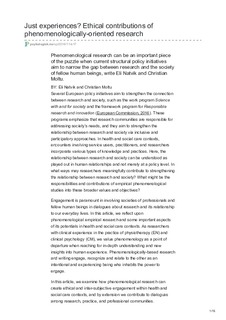Just experiences? Ethical contributions of phenomenologically-oriented research
Peer reviewed, Journal article
Permanent lenke
http://hdl.handle.net/11250/2449103Utgivelsesdato
2016Metadata
Vis full innførselSamlinger
Sammendrag
How can phenomenologically-oriented research contribute ethically to societies of practitioners? In this article, we discuss how first-person research can create ethical and inter-subjective engagement and how it can contribute to conscious dialogues among practice, research, and professional communities. Phenomenology is our epistemological point of departure, and we illustrate practical ethical potentials through examples of phenomenologically-oriented research. To establish the conceptual groundwork for our examination, we primarily draw on the Norwegian philosopher Hans Skjervheim’s work on experiences, existence, and engagement. We review empirical examples from phenomenological research and texts to illustrate tensions between approaching experiences with openness and engagement and approaching experiences as just experiences. We go on to consider the ethical meanings attached to these tensions. We argue that because phenomenologically-oriented empirical research inhabits the power to engage, it offers insights into lived experience and may be a promising approach to developing conscious dialogues among research, practice, and society of fellow human beings.
